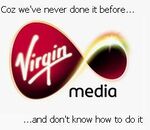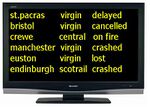Virgin Media
Virgin Media (formerly known as NTL or "Not Terribly Likely") is a sociological experiment conducted in jointly by the universities of Oxford and Cambridge in the United Kingdom. The remit of the experiment is:-
- "To determine to what extent humans may be pushed, before they refuse to accept incompetence of an organisation, and to what depths customer service may be plunged, before they no longer tolerate a given service (or lack thereof)"
The virgin franchise is owned by Mr. Richard Branston (who gets everything in a pickle). The name 'virgin' comes from the fact that his business expertise comes from flying balloons round the world, and in such a life-style, one will never have sex.
Origins[edit]
The premise[edit]
The experiment was first proposed in 1987 by professor Jurgen Klinsmann of Cambridge University, who had observed that as society had evolved from a community society in the 1960s to en masse consumer society of modern times that "It would appear the people are becoming more tolerant of poor quality and service, and willing to accept almost any excuse." Notably, he remarked that:-
- "Big companies argue that due to the dis-economies of scale that it is unreasonable for them to follow customers' requests, and consumers seem to accept this. For example, a customer will ask 'When is the repairman coming to fix my TV service?' and the response which will be fully accepted by the customer will be 'I'm sorry, it's not on the computer.' This is what I refer to as the 'aura of impossibility'"
Professor Klinsmann started the NTL project to determine whether or not this was really true, and to just what extent it existed.
The company[edit]
Professor Klinsmann had observed that large telecommunications companies in particular had an aura of impossibility about them, and so founded NTL telecommunications in 1990. In 1996, the experiment was branched out in the the field of Internet service provision, with the launch of the cable internet service. In 2006, "Virgin Mobile" was acquired (see "The future", below).
Fatal Problems[edit]
Virgin also "operate" trains on UK railways. Last year Virgin Media got into a bit of a muddle with the channels (right).
Research results[edit]
Only limited results are currently published by Prof. Klinsmann, as he does not wish to unduly influence opinions of customers and the results of this experiment (indeed, if you are so much as reading this article, you should terminate all services provided by NTL immediately - not because it will affect the results but well, they're crap, aren't they). However, in 2000, the experiment announced that despite a Tannenbaum-Kaufman Customer Service Rating of just 2.3%, NTL's churn rate was just 7.7%. It should be noted that the churn rate jumps to 97% when customers who wished to terminate their contract but couldn't get through to customer services on the phone are included. An example response from a customer can be found here.
Landmarks[edit]
- 1987 Prof. Klinsmann comes up with the idea for the project.
- 1989 Cambridge and Oxford universities agree to fund the project.
- 1990 NTL telecommunications founded.
- 1996 Experiment brances out into Internet service provision.
- 2000 Interim data published.
- 2006 With the acquisition of Virgin Mobile, the experiment goes "foreplay". Odd, seeing as it had only just become known as Virgin.
Future research[edit]
The acquisition of 2006 of "Virgin Mobile" by the NTL experiment represents an interesting move. Where in its original form, the experiment was merely dealing with a new, unknown company, the next phase is to see if they can destroy the reputation of a previously known and highly reputable company.

